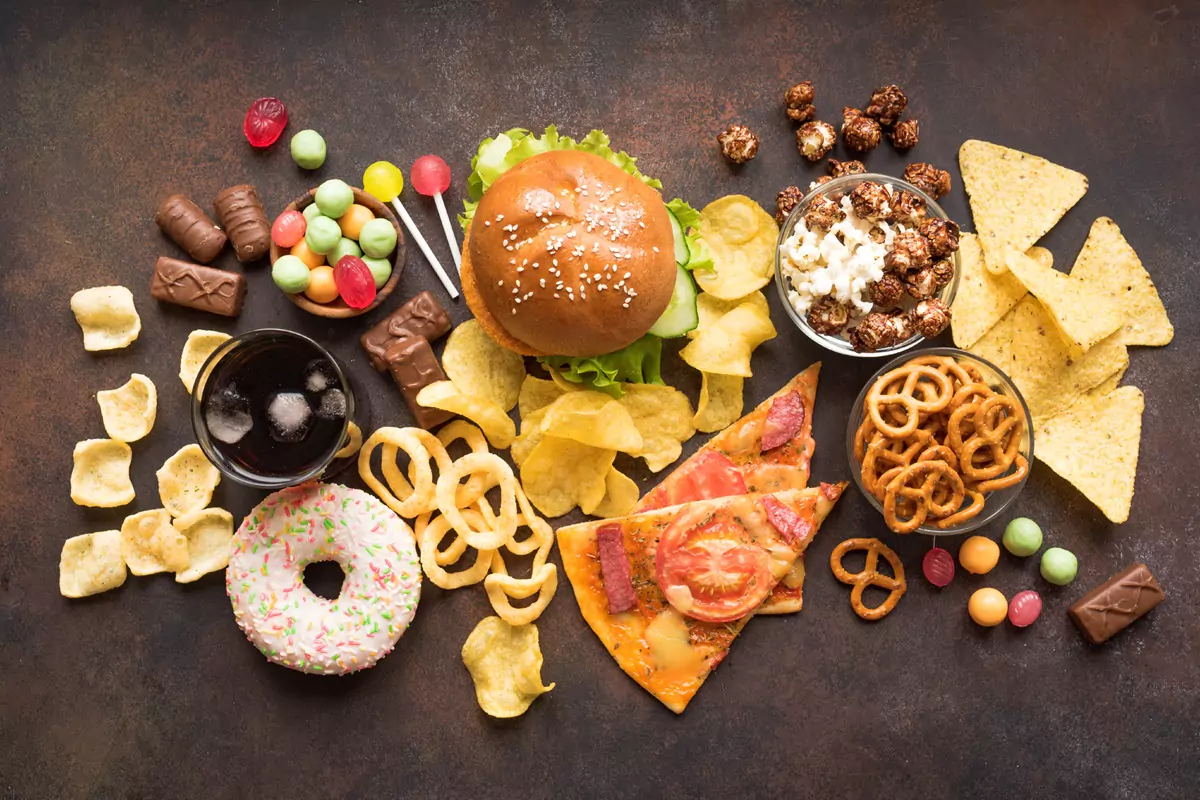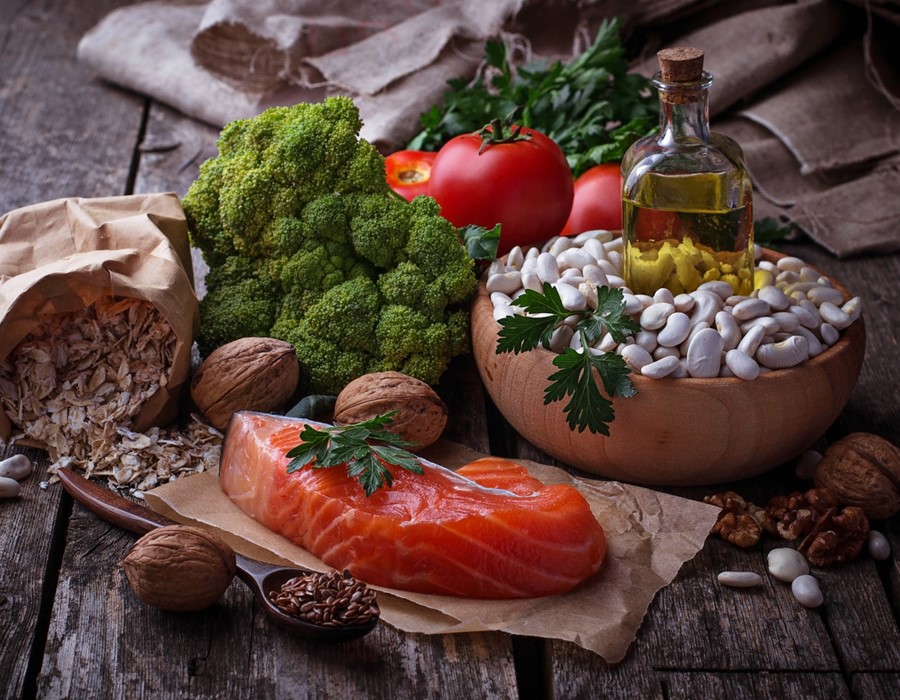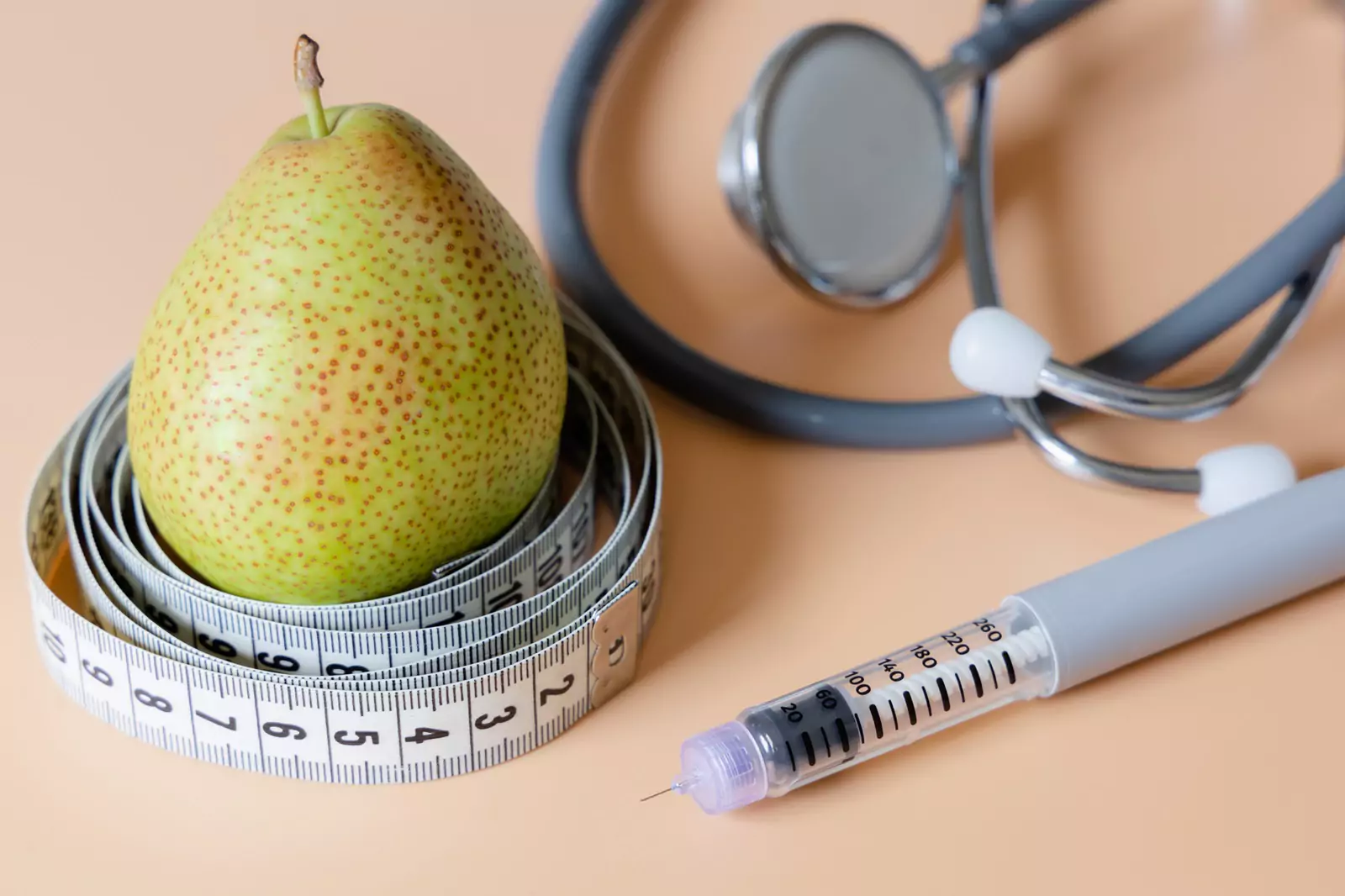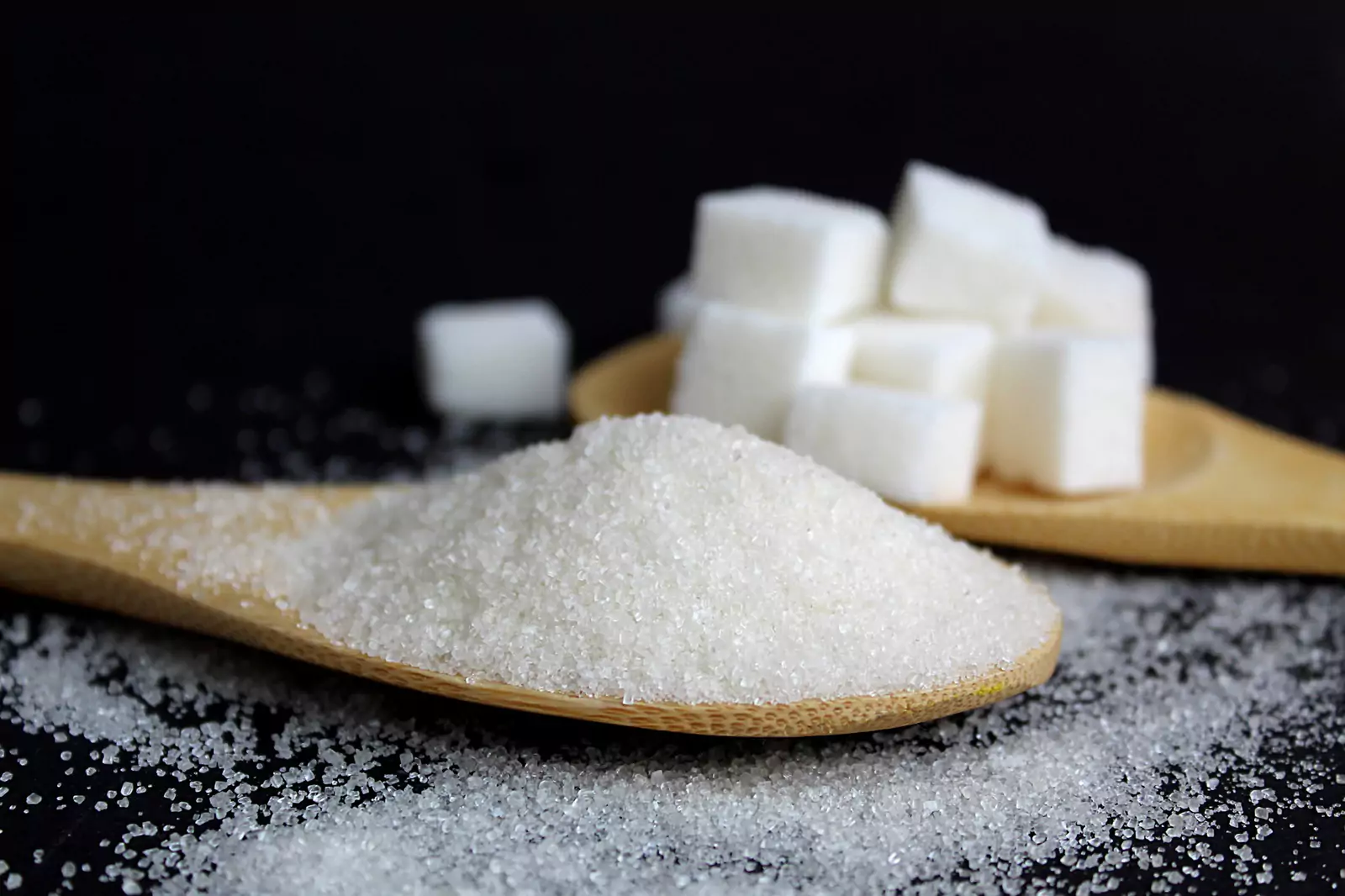
UP TO 40% OFF SITEWIDE






6 Foods That Cause Diabetes


Table of Contents
- What is Diabetes?
- Relationship Between Diabetes and Food
- 6 Foods that Cause Diabetes
- Sugary Drinks
- Processed Grains
- Fried Foods
- Red Meat
- Trans Fats
- Refined Carbohydrates
- SUGARMD ADVANCE GLUCOSE SUPPORT
- Beverages That Increase Diabetes Risk
- Sweet Alcohol
- Sweetened Sodas or Teas
- Sports Drinks
- Regular Soda or Diet Soda
- Measures to Take Control of Diabetes
- Conclusion
- About The Author
The food we consume can affect our health in a variety of ways and diabetes is no exception. You may already be familiar with some of the factors that can increase your risk of diabetes such as being overweight, leading an inactive lifestyle and having a family history of diabetes.
But you may not know that there are also certain foods that can directly increase your risk of diabetic complications. In this article, we will explore the 6 foods that cause diabetes and provide tips on how to manage your diet to reduce your risk of diabetes.
What is Diabetes?
Diabetes is a chronic metabolic disorder characterized by high blood glucose. It occurs when the body is unable to properly use and store glucose which is the primary source of energy for cells. When glucose levels become too high, it can cause serious health problems. There are two main types of diabetes.
Type 1 diabetes is an autoimmune disorder where the body's own immune system destroys beta cells which produce insulin.
Type 2 diabetes is a chronic condition where the body cannot produce enough insulin or the body cannot use its insulin properly. The exact cause of diabetes is unknown but it is believed to be a result of genetic and environmental factors. Genetics may play a role as some people are more likely to develop type 2 diabetes. Other possible environmental factors include poor diet, sedentary lifestyle and obesity.
Relationship Between Diabetes and Food
Food plays a crucial role in the development of diabetes. The type of foods you consume the amount you eat and how often you eat them can all impact your risk of developing diabetes. It is important to be mindful of your food choices as they can increase or decrease your risk of developing type 2 diabetes.
Foods that are high in glycemic index have been linked to an increased risk of type 2 diabetes. This is because they tend to spike your blood sugar levels quickly, leading to insulin resistance and weight gain. The risk of developing diabetes can be further increased by consuming large amounts of sugar sweetened drinks.
These foods are high in calories which can lead to weight gain and increase the risk of type 2 diabetes. Processed foods and processed meat are also associated with an increased risk of developing type 2 diabetes. These foods are often high in unhealthy fats, salt and sugar which can lead to weight gain and insulin resistance.
On the other hand, making healthier food choices such as consuming a balanced diet that is rich in fruits, vegetables, whole grains and lean proteins can help reduce the risk of developing type 2 diabetes. It is important to limit your intake of foods that are high in added sugars, unhealthy fats and salt and to focus on nutrient-dense foods that will help maintain a healthy weight and support overall health.
The relationship between food and diabetes is complex and multifaceted. By being mindful of the types of foods you consume and how often you eat them, you can help reduce your risk of developing type 2 diabetes. By focusing on nutrient-dense foods and limiting your intake of processed foods and sugar sweetened drinks, you can support your health and reduce your risk of developing this chronic condition.
6 Foods that Cause Diabetes
Certain foods have been linked to diabetes due to their high sugar content, high fat content and low nutritional value. Eating a diet high in these foods can increase the risk of developing type 2 diabetes. The following are 6 foods that have been identified as having the potential to cause diabetes:
Sugary Drinks
Sugary drinks are a major culprit when it comes to the foods that cause diabetes. While most people are aware of the link between sugary drinks and diabetes, many don’t realize just how serious the risk is. Numerous studies have revealed that drinking just one sugary beverage per day can increase a person’s risk of developing type 2 diabetes by up to 26%. '
Sugary drinks include sodas, energy drinks, sports and energy drinks, fruit-flavored drinks, sweetened teas and sweetened coffee drinks. These drinks are high in added sugars, including fructose, glucose and sucrose which are rapidly absorbed into the body. This causes glucose levels to spike and over time the body's insulin response weakens, leading to a greater risk for diabetes.
The best way to avoid the negative health effects of sugary drinks is to limit or avoid them altogether. Adults should consume fewer than 10% of their daily calories from added sugars which includes the sugar from sugary drinks. When choosing a beverage, opting for a no-calorie drink such as water, unsweetened tea or coffee, is recommended.
Processed Grains
Processed grains, like white flour, white rice and white pasta can also be a cause of diabetes. These types of processed grains are often found in many processed foods and their refined form can increase the risk of diabetes. This is because processed grains break down quickly in the body and are absorbed as sugar, resulting in higher blood glucose levels and an increased risk of diabetes.
Additionally, processed grains lack the fiber, vitamins and minerals found in whole grains which can further contribute to an increased risk of diabetes. It is important to note that while processed grains are a potential cause of diabetes they are not the only cause.
Eating excessive amounts of any type of food can contribute to diabetes as it can lead to weight gain and unhealthy levels of insulin in the body. To reduce the risk of diabetes, individuals should consider replacing processed grains with whole grains whenever possible and limiting their intake of all processed foods. Doing so can help to keep blood glucose levels under control and reduce the risk of developing diabetes.
Fried Foods
These are a major contributor to the 6 foods that cause diabetes. For those living with diabetes, fried foods can be a real challenge. Eating fried foods may cause a spike or drop in blood sugar levels and because of this, it is important to check your blood sugar regularly when consuming fried foods. When it comes to fried foods, it is best to choose options that are low in fat such as grilled or baked items, rather than deep fried.
Examples of fried foods that should be avoided include French fries, potato chips, donuts and fried chicken. These foods are high in fat and carbs which can contribute to a spike in blood glucose levels. Additionally, fried foods tend to be high in calories so consuming large amounts of them can contribute to weight gain, increasing the risk of type 2 diabetes.
When it comes to fried foods, it is best to opt for those that are fried in healthier oils such as olive oil or avocado oil which are high in monounsaturated fats. However, when consuming fried foods, it is important to do so in moderation and to monitor your blood sugar levels.
Red Meat
While red meat, including beef, lamb and pork can be part of a healthy diet, eating too much of it can have negative health consequences. Diets that are high in red meat have been associated with an increased risk of type 2 diabetes due to its saturated fat, cholesterol, heme iron and nitrate/nitrite content which are all components of red meat.
Saturated fat and cholesterol can increase levels of LDL cholesterol in the blood which can contribute to insulin resistance. Heme iron which is found only in animal tissues, may also increase the risk of type 2 diabetes by promoting oxidative stress in the body. Finally, nitrates and nitrites which are added to processed meats to preserve them can have a damaging effect on the delicate cells in the pancreas that produce insulin.
Overall, while red meat can be part of a healthy diet, it is important to limit your intake as eating too much of it can increase your risk of type 2 diabetes. It is recommended to limit intake of red and processed red meats to no more than 18 ounces (500 grams) per week.
Trans Fats
Trans fats are a type of unsaturated fat that is created when vegetable oils are chemically altered through a process known as hydrogenation. Trans fat is found in a variety of foods and is known to increase the risk of type 2 diabetes as it has been linked to higher levels of insulin resistance. Trans fats can be found in a variety of processed foods such as fried foods, baked goods and margarine.
It can also be found in some restaurant and fast food meals. Research has found that individuals who consume higher amounts of trans fats have a greater risk for developing type 2 diabetes so it is important to avoid foods that contain them. To avoid trans fats, it is important to read food labels and avoid processed and restaurant foods.
When looking for food labels, it is important to avoid foods that contain partially hydrogenated vegetable oil as this is a type of trans fat. It is also important to limit the consumption of fast food as many of these meals contain higher amounts of trans fats. Additionally, it is important to be aware of the foods that use trans fats in preparation as even small amounts can contribute to an increased risk of diabetes. By avoiding trans fats, it is possible to reduce the risk of type 2 diabetes.
Refined Carbohydrates
Refined carbohydrates are foods that have had their natural fiber, vitamins and minerals stripped away during processing, leaving behind foods that are high in sugar and low in nutrients. Examples of refined carbohydrates include white bread, pastries, cookies, crackers, pre-packaged snacks such as chips and pretzels and sugary cereals.
These foods can be particularly problematic when eaten in large quantities, due to their high glycemic index. Refined carbohydrates are digested quickly by the body, leading to rapid spikes in blood glucose. This can overwhelm the body's ability to handle the increased load of glucose, leading to a condition known as insulin resistance which is a precursor to diabetes. In order to reduce the risk of diabetes, it is important to limit the amount of refined carbohydrates in the diet.
When choosing carbohydrates, it is better to select whole grains or complex carbohydrates such as oats, quinoa, barley and brown rice as these are digested more slowly and will not cause the same rapid spikes in blood glucose. Additionally, it is important to combine carbohydrates with a source of protein or healthy fat such asnuts, seeds, avocado or olive oil in order to help slow down digestion. By following these tips, it is possible to enjoy carbohydrates without putting oneself at risk of developing diabetes.
SUGARMD ADVANCE GLUCOSE SUPPORT
Maintaining healthy blood sugar levels can be a challenge. From carby meals to snacks and even with all the effort, it’s still not enough. That’s where SugarMD Advanced Glucose Support comes in. Our blend of traditional Ayurvedic herbs helps regulate blood sugar levels, curbs cravings, supports weight loss, boosts metabolism and energy. Endorsed by endocrinologists, this unique formula of pure, potent herbs promotes overall blood sugar health. Ideal for both pre-diabetics and Type 2 diabetics.
Beverages That Increase Diabetes Risk
In addition to food there are certain beverages that can also increase one’s risk of developing diabetes. Fruit juices are often high in sugar and lack the fiber found in whole fruit. Alcoholic drinks also contain large amounts of sugar and can be difficult for the body to process.
Drinking alcohol in moderation can help to reduce the risk of developing diabetes but it can also have a negative effect on overall health. To reduce their risk, those with a family history of diabetes should limit the amount of these 6 foods that cause diabetes that they consume.
Sweet Alcohol
When it comes to food and drinks that can increase the risk of type 2 diabetes, sweet alcoholic beverages should not be overlooked. Although the American Diabetes Association does not recommend consuming sugary drinks some sweet alcoholic beverages contain enough sugar to cause an increase in the risk of diabetes.
Alcoholic drinks such as beer, liquor and wine can be enjoyed in moderation but those that contain added sugars such as fruity drinks or cocktails, should be avoided. Cocktails and flavored drinks often contain large amounts of sugar and can quickly spike blood sugar levels.
It also appears that drinking alcohol, even in moderate amounts can increase insulin resistance which is a key factor in the development of type 2 diabetes. It is important to note that not all alcoholic drinks contain high levels of sugar and that light beer and wine tend to be low-sugar options.
However, it is still important to remain aware of the amount of sugar present in alcoholic drinks and avoiding sweet drinks can help reduce the risk of diabetes. In summary, sweet alcoholic drinks such as fruity cocktails and sweet wines can increase the risk of type 2 diabetes and should be avoided. When drinking alcohol, opt for low-sugar options such as light beer and wine.
Sweetened Sodas or Teas
Sugar-sweetened drinks are one of the leading contributors of added sugar in the American diet. The high sugar content of these sugary beverages allows for a quick and large boost in blood sugar levels. This, in turn can lead to the development of type 2 diabetes. When assessing the impact of sugar-sweetened drinks on diabetes risk, researchers have found that the risk increases with consumption.
A systematic review published in 2019 found that individuals who drank one or more sugar-sweetened beverages per day were 26-27% more likely to develop type 2 diabetes compared to those who drank less than one per month. In addition to the direct link between sugar-sweetened drinks and diabetes there is also a link between the consumption of these drinks and weight gain.
Being overweight or obese can increase a person’s risk of developing diabetes so reducing the consumption of these high-sugar drinks can also reduce the risk of diabetes. Although avoiding sugary drinks altogether is one way to curb diabetes risk there are other options.
Low-calorie sweeteners can be used to reduce the sugar content of these drinks and still provide a sweet taste. Water is also a great and healthy alternative to sweetened sodas or teas. Ultimately, reducing sugary drink consumption and replacing them with healthier options can help to reduce the risk of diabetes.
Sports Drinks
Sports drinks often contain high amounts of sugar and other carbohydrates in the form of fructose and sucrose. One of the most common forms of added sugar found in sports drinks is maltodextrin which is a rapidly digested, high glycemic index carbohydrate. Consuming a large quantity of these drinks can cause an increase in your blood glucose levels and can raise your risk of developing type 2 diabetes.
Furthermore, sports drinks also contain artificial sweeteners and flavorings which may interfere with insulin sensitivity. In addition they can be high in sodium which can further damage blood sugar regulation. Lastly, sports drinks are also high in artificial colorings and preservatives which can increase oxidative stress, a factor involved in the development of diabetes.
For those who are concerned about their risk of developing diabetes, it is best to avoid or reduce their consumption of sports drinks. Instead, water and milk are options that are far lower in added sugar and are safer when it comes to diabetes risk.
Regular Soda or Diet Soda
It is important to note that while regular soda and diet soda may not directly cause diabetes they can significantly contribute to an increased risk of developing the disease. Studies have found that people who drink regular soda regularly have higher rates of type 2 diabetes than those who do not. Likewise, drinking diet soda is linked to an increased risk of metabolic syndrome, an umbrella term for a set of conditions that can lead to diabetes.
Although many people use diet soda as a way to reduce their sugar intake the artificial sweeteners can still have an effect on blood sugar levels. In addition, drinking too much diet soda can lead to dehydration which can increase the risk of developing diabetes.
In summary, although regular and diet sodas may not directly cause diabetes they can contribute to an increase in the risk of developing the disease. It is important for people with diabetes or those at risk of developing the condition, to limit their intake of these beverages to decrease their chances of developing the disease.
Measures to Take Control of Diabetes
Diabetes can be a serious and debilitating condition if not properly managed. But with the right care and a few lifestyle changes, it is possible to take control of diabetes and reduce the risk of its complications. Here is what you need to know to manage diabetes best:
1. Eating a Healthy Diet: One of the most important steps you can take is to adopt a healthy diet. This means avoiding the 6 foods that cause diabetes such as refined grains, sugary drinks and processed meats. Instead, focus on eating a balanced diet that is rich in fresh fruits and vegetables and low in added sugars, salt and unhealthy fats.
2. Increasing Physical Activity: Physical activity is a key part of diabetes management. Regular exercise helps to keep your blood sugar levels in check and also reduces risk factors for other health conditions such as heart disease. Aim for at least 30 minutes of physical activity per day.
3. Quit Smoking: Smoking is known to increase the risk of diabetes complications so it is important for people with diabetes to quit smoking if they are able to.
4. Monitor Glucose Levels: It is important to monitor glucose levels on a regular basis, especially if you have Type 1 or Type 2 diabetes. This will help you and your doctor to determine if your diabetes management plan needs to be adjusted.
5. Take Medication as Prescribed: If you are prescribed medication for diabetes, it is imperative to take it as directed. This helps to keep your blood sugar levels under control.
6. Visit the Doctor Regularly: Regular checkups with your doctor are essential for successful diabetes management. During these visits, your doctor can check your glucose levels and make any necessary adjustments to your care plan. By following these steps, you can take control of your diabetes and reduce your risk of its complications. If you have any questions or concerns, talk to your doctor.
Conclusion
In conclusion the food we eat plays an important role in the risk of diabetes. By making healthy food choices, regulation of our weight and regular exercise, it is possible to reduce the risk of diabetes. Having large amounts of sugary drinks and processed grains increases the risk of diabetes.
If you're looking to manage blood sugar levels and support metabolic health, consider these products: Berberine 1200mg, known for its effectiveness in balancing glucose levels; Sugarmd Super Berberine, a powerful blend of berberine and cinnamon for enhanced glucose support; and Resveratrol, which promotes overall metabolic well-being. Adding these supplements to your routine could be a proactive step in maintaining healthy blood sugar levels.
Eating meals high in red meat, trans fats and refined carbohydrates should be avoided. Finally, it is recommended to replace sugary drinks with regular soda or diet soda for healthier living. Diabetes is a serious health condition that must be taken seriously and it is important to make dietary changes to help prevent or manage the condition.
About The Author
Meet Dr. Ahmet Ergin a highly skilled and dedicated endocrinologist with a passion for diabetes care. Dr. Ergin earned his medical degree with honors from Marmara University in Istanbul. He completed internal medicine residency and endocrinology fellowship at Cleveland Clinic.
Dr. Ergin is board-certified in Internal Medicine, Endocrinology, Diabetes and Metabolism due to his vast medical expertise. He's a certified diabetes educator, author of "The Ultimate Diabetes Book," and founder of "the SugarMD YouTube channel." Dr. Ergin offers exceptional diabetes care to his patients in Port Saint Lucie, FL, helping them manage effectively.
Disclaimer: The website's disease and treatment info is general guidance and not a substitute for professional healthcare advice. Seek professional advice for personalized diagnosis and treatment plans to ensure accurate and effective care. Consult a qualified healthcare professional for any questions about your health and wellness.
Written By Dr. Ahmet Ergin
466 total articles
Meet Dr. Ahmet Ergin, a highly skilled and dedicated endocrinologist with a passion for diabetes care. Dr. Ergin earned his medical degree with honors from Marmara University in Istanbul. He completed internal medicine residency and endocrinology fellowship at Cleveland Clinic. Dr. Ergin is board-certified in Internal Medicine, Endocrinology, Diabetes, and Metabolism due to his vast medical expertise. He's a certified diabetes educator, author of “The Ultimate Diabetes Book,” and founder of “the SugarMD YouTube channel.” Dr. Ergin offers exceptional diabetes care to his patients in Port Saint Lucie, FL, helping them manage effectively. For a closer look into his insights and experiences, connect with Dr. Ahmet Ergin on LinkedIn, Instagram, and YouTube.”
Disclaimer: These statements have not been evaluated by the Food and Drug Administration. Information on this website isn't intended to treat, cure or prevent any disease. Discuss with your doctor and do not self-treat.
Products















